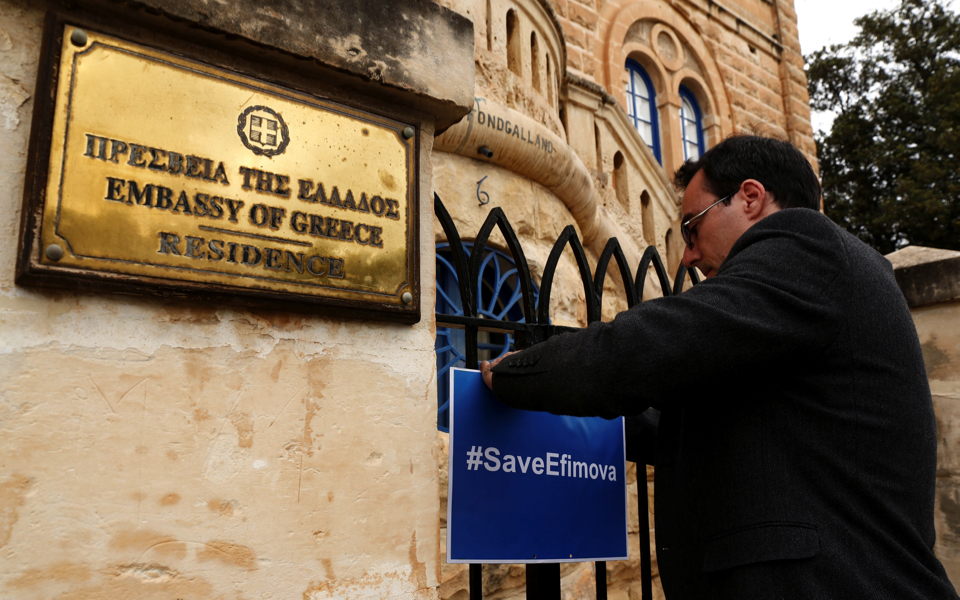Russian whistleblower tells Kathimerini of her fears after Maltese journalist’s murder

The Russian whistleblower Maria Efimova, who is being detained in a prison in Thebes after her arrest on March 20 by Greek authorities executing two European arrest warrants, explains in an interview with Kathimerini how she fed information to the murdered Maltese investigative journalist Daphne Caruana Galizia, helping her reveal the alleged corruption at Pilatus Bank.
She also presents the background surrounding the leak of her name in the Maltese press. “It was I who first sent an e-mail to Daphne. I had read her articles on the activities of Pilatus Bank. She had some information and I decided to help her. Before I left Pilatus, I had gathered evidence on its illegal activities,” the 36-year-old said.
As Kathimerini wrote on March 23, Efimova was the secondary source of the Maltese journalist, confirming the evidence she had already collected. Caruana Galizia’s primary source remains unknown to this day.
According to the journalist’s research, Pilatus Bank is alleged to have facilitated shady transactions by the company Egrant Inc. that reportedly belonged to the spouse of Malta’s Prime Minister Joseph Muscat. Muscat and his wife have denied the accusations.
Efimova told Kathimerini her name was leaked to the press on May 2016. “A judge gave my name to the press. After Caruana’s reports, I went to testify on everything I knew. I didn’t join a witness protection program, but the judge assured me my name would remain secret,” she said.
She decided with her Greek husband and their two children to leave Malta on June 2017.
“We went to several countries before ending up on Crete in September. I was watching news in Malta. It was mainly focused on an imminent parliamentary election and I assumed that my case was slowly being forgotten. But in October Caruana was murdered in a car bombing. I didn’t ask for protection but I spoke with a delegation of MEPs and told them I am ready to help the investigation and find the journalist’s killers,” she said.
Efimova had been on Crete for almost seven months and was preparing her CV to find a job, but her life was becoming increasingly difficult, as she told the paper. She had been told that her former boss at Pilatus Bank would soon be arrested and she was worried she could face retaliation for the information she had provided.
“There was fear that something would happen to me before the arrest, as part of the information on the bank’s activities had come from me,” she said.
That’s when she decided to seek the help of Greek authorities. “I immediately came to Athens just to give myself up. I didn’t do it on Crete, because that’s where my family was.”
At dawn on March 20, Efimova voluntarily appeared at a police station in Syntagma, central Athens, to ask for protection. That’s when authorities discovered there were two Maltese arrest warrants pending, and she was detained.
On the same day, the bank’s chairman Ali Sadr Hashemi Nejad was arrested in the United States for money laundering and evading US sanctions against Iran. “I worked as the bank owner’s private assistant from January to March 2016. Then they fired me. In the relevant letter they sent me they did not mention the reason for my dismissal,” she said.
“I had worked in a bank before and had experience in compliance departments. I often told them, ‘What you are doing is illegal.’”
Legal problems
Her legal headache with her former employer, Pilatus Bank, started when she claimed unpaid wages. The bank moved against her, accusing her of using company money without authorization to pay for her husband and children’s airline tickets to Germany and Thessaloniki, and for her father-in-law to fly from Cyprus to Malta.
According to court documents seen by Kathimerini, on August 10, 2016, Efimova was interrogated by two Maltese police officers on these charges. In a report she filed, the 36-year-old claims she was mistreated, saying one of the officers pushed her and took her mobile phone while two Pilatus Bank executives attended the interrogation. She also said one of the police officers insulted her while the other was saying he was certain of her guilt.
“The policemen who interrogated me told me, ‘We are friends of the bank,’ and they even pressured me to apologize to the bank executives they had brought to the police station,” she said.
According to information, one of the police officers who interrogated her has since quit his position with the Maltese police and said he is willing to come to Greece and testify in favor of the Russian whistleblower when her case is heard at the Appeals Council.
Efimova was initially sent to Korydallos Prison and then to Eleonas in Thebes.
“She’s in good shape, but she is emotionally upset as she’s not used to detention,” her lawyer Alexandros Papasteriopoulos said.
A Greek police source told Kathimerini no arrest warrants are pending against Efimova in Cyprus. Cypriot authorities are said to have tried to lodge a Red Notice for the Russian, but Interpol’s general secretariat dismissed their request, saying the evidence submitted was insufficient.





